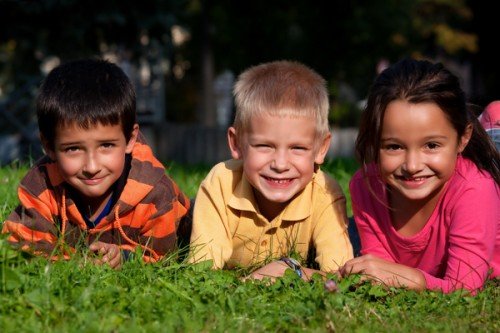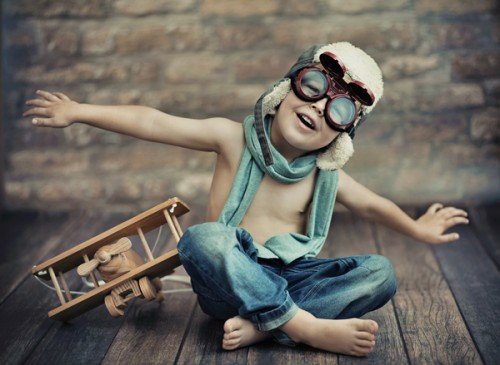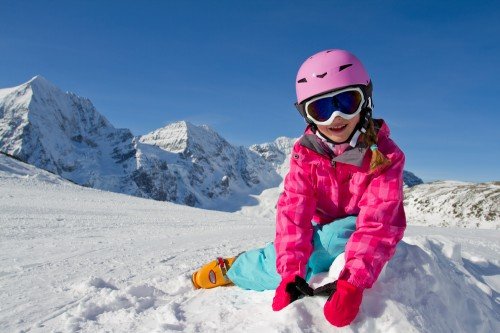
Copyright Shutterstock
Usually we see the kids from above. We are used to seeing the top of the child's head and the moment when he looks back at us with tears or a smile. It turns out that when we take a photo from this angle, we get quite a familiar result. The brain seems to say, "I've already seen this many times."
If you want to take photos that will really attract attention, go down to the height level of your children. If you are not crawling on the ground during the photos, then most likely you are too high for a good photo. If you want to make your photos even more interesting, then find a way to photograph your children from the bottom up.

Copyright Shutterstock
The aperture controls the depth of field. And the depth of field has a huge impact on how the story that the photo tells looks like. By adjusting the depth of field, you focus the audience's attention on a certain point in 3-dimensional space and blurring the rest of the details. In fact, you are saying: this place is more important than the others! Focus your attention on it. This is the highlight of this photo.
Use the aperture to highlight the most important parts of the photo, blurring all other details. It may take some time to learn how to focus, especially if you are photographing more than one person.
You may find that you have blurred the person you really wanted to highlight. This means that the depth of field was too small, reduce the aperture and try again.
Since you are just learning to focus on objects using a small depth of field, then immediately after you took the first picture, look at the result. Take a closer look at the faces of all the people in the photo, increasing it by 100%. Make sure that everything is fine right away, and not after you get home and realize that you have ruined all the photos.

Copyright Shutterstock
A good photo is not just a beautiful picture. A good photo tells a story!
Once you master the basics of photography and make friends with your camera a little bit, you will feel quite comfortable working with exposure, aperture, shutter speed and ISO levels, you will be able to use the camera more intuitively and spend less time adjusting certain parameters. At this stage, you will free yourself from constant thoughts about settings and other technical aspects and focus on emotions and the story you want to tell.
When you're going to take a photo, don't think about it being cute or impressive. Instead, think about what kind of story you want to tell.If you were holding a piece of paper and a pencil in your hands instead of a camera, what exactly would you write about your children at this very moment? A camera is not a device for taking photos, but a story is a recording device. Interesting stories unfold in front of you and around you at almost any moment of time. Stop for a moment and hear them.
If your subject for photography does not feel that you are currently open to him, then most likely he will not want to tell his story.
In many photos where people look nervous or clamped down, the problem is not in the people, but in the photographer, whose mood is transmitted to the objects for the photo. Everything that you feel at the time of photographing is most likely felt by those people whose picture you are taking. And it will be visible in the photo. The ability to control your emotions and internal mental processes is a real art. And the best "family" photographers are those who have spent years honing this skill.
To take good family photos, you do not need to embark on the path of enlightenment, self-knowledge, meditation and eat grasshoppers on a mountain in Tibet. But you can, for example, keep in mind that most people don't like to have their photos taken just for the sake of taking pictures. People like to share their hobbies and interests.Before taking the camera, talk to the children about their toys, friends and hobbies. You will establish contact, relax and create a good context for shooting a photo session.

Copyright Shutterstock
Many people just don't realize that a photo has two elements: foreground and background. Everyone understands and perceives the foreground as the place where a child, husband or wife or the whole family is usually placed.
The background is usually neglected. And in vain, because he plays an important role in the creation of the composition. Symmetrical and blurry (see paragraph 2 about the aperture) background, on which there are no random people and "stray" objects, is a classic that is used in most good family photos. When you take a picture, pay attention to natural and man-made objects that create a background for the photo. These can be doorways, bridges, houses, trees and mountains.